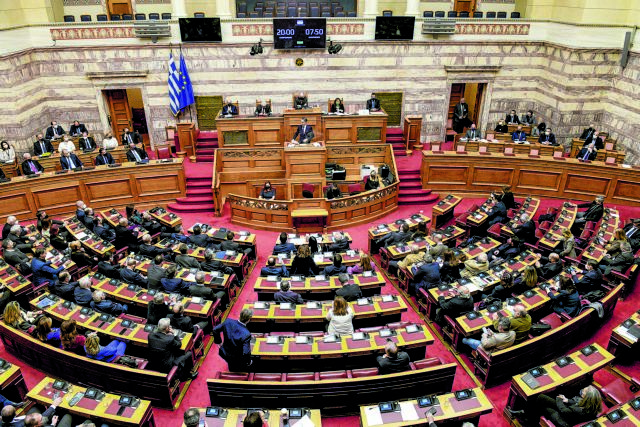
The double elections of May and June 2023 are characterized by some unprecedented effects on the evolution of the Greek political system. They took place in a political context with the lowest polarization and acrimony since 1974. They showed a new coalition with an unprecedented difference in electoral influence from the second party, and maintaining electoral influence under adverse conditions from 2019.
They caused the opposition to fragment into a new form of asymmetry with a dominant party and the division of opposition seats without the emergence of a strong main opposition party. They formed a new focus of contention with parliamentary representation due to the entry of different partisan expressions of the extreme right. The above basic findings provide some positive interpretations, but also some worrying indications.
In the positive interpretations it must be stated that the political system has now recovered conditions of stability and moderation after the decade of multiple crises 2010-2020 and the test of the viability of the state and the resilience of democracy (the risk of bankruptcy, the economic adjustment programs and the serious economic and employment consequences, the unprecedented crisis of confidence in political institutions, government instability, the pandemic, the new recession and the energy crisis).
The leaderships of the three strongest parties agree on the European orientation of the country, and on the systematic effort to synchronize national policies with the goals of governance in the EU. This does not only result from the verbal admission, but mainly from the practical will, since these parties participated in government schemes since 2010 and their actions while in government confirm the unwavering attachment to European integration.
This development had also taken place after 1993 when the cross-party acceptance of the European Monetary Union-EMU established economic reforms and institutional modernization as the norm, and the Maastricht criteria had neutralized the most serious foci of confrontation on economic policy (and the bitter consequences of polarization between 1981-1993). This contributed to the de-ideologicalization of economic policy issues, and the emphasis on government efficiency.
The 2023 elections reflect a similar development in which the credibility of the party body, the political leadership, the clarity of the government program and the will and quality of the political staff were a key factor in the electoral competition. This explains the unprecedented asymmetry in the electoral influence of the coalition and official opposition, as the latter seriously lagged behind in highlighting these elements, despite the fact that these elements guided the Tsipras government 2015-2019 in the first phase of trying to recover the prosperity levels of the rest of Europe.
However, as happened in the period 1993-2009, the cross-party consensus does not discount the positive government results. The fiscal derailment after 2000 and the lack of reform in fields in which national policy coordination was not accompanied by the close supervision of European institutions (eg insurance, health, state reorganization) document the visible risk of a new phase of backwardness for the country.
This risk is also reinforced by the distribution of parliamentary power. An asymmetric party system emerged for the first time since 1977 with one dominant party and the distribution of opposition seats among several smaller parties. This means that the official opposition will be deprived (numerically and qualitatively) of the possibility to exercise effective parliamentary control. In the coming period, SYRIZA will focus on issues of internal party reconstruction, without the consequences for its political role for the democratic control of the coalition being visible.
The 2019-2023 period, despite the significant successes, was also characterized by a significant lag in individual policy fields (e.g. tax policy efficiency, reorganization of the state beyond digital services), while the concentration of powers in PM’s office caused serious institutional issues (e.g. wiretapping ), without always preventing mediocre and poor performance in some ministerial portfolios through the continuous evaluation of government staff.
Another problem for government operation is that the Mitsotakis government gave more weight to the (correct) choice of planning government work with a clear goal-setting framework, which guided the action of government officials. However, less emphasis was placed on ex post facto evaluation of policy outcomes, as well as of government personnel. This explains the impossibility of understanding the pathologies that still existed in individual functions of the state, but also the assignment of portfolios to political figures who showed poor dedication or performance in their duties.
The omens are not particularly positive for the governments second term. The Simitis II government (2000-2004) did not formulate a substantial reform program for economic reconstruction beyond the EMU, while the government direction was undermined by intra-party rivalries and the prevalence of party priorities (the new electoral victory) at the expense of government priorities ( of deliverables of beneficial government work).
As typically mentioned in government leadership studies, every prime minister knows that at the cabinet table he is talking to those who seek to succeed him. We do not yet know how such competition will play out over four years, but its consequences will be negative for the direction of government work.
Moreover, the de-ideologicalization of electoral competition and the fragmentation of the opposition creates a question of representation for the political system. This is expressed in the parliamentary representation of new small parties, which indicates that there is still a group of neo-indignants, who slander governments and mainstream political parties, and express their dissatisfaction with the country’s outlook. This part of society should not be marginalized, but an attempt should be made to understand the reasons that fuel this anti-systemic tendency, and the more specific political demands.
Many times the electorate works in terms of ebb and flow. Today the electorate decided by a majority the formation of an autonomous government with a clear framework of mandate for the fulfillment of essential indicators of well-being according to European data. The possible refutation of these demands and expectations may cause by 2027 reverse attitudes in electoral behavior.
The presence of the multifaceted anti-systemic parties is a reminder that the stability of the political system is not at the mercy of God, but of the people and governments. Today’s “hosannas” can quickly turn into disapproval, as very often happens with the rapid deterioration of the political capital of even the strongest governmental leaderships in modern Europe. Characteristically, the Macron rule now has the extreme right and the anti-systemic left as its opponent, and not some alternative moderate centrist force. The first electoral test is the Euro-elections of June 2024, and possibly another phase in the evolution of the party system.
Manos Papazoglou is Associate Professor of Political Systems at the Department of Political Science and International Relations, University of the Peloponnese
Latest News

Mitsotakis Unveils €1 Billion Plan for Housing, Pensioners, Public investments
Greek Prime Minister Kyriakos Mitsotakis has announced a new set of economic support measures, worth 1 billion euros, aiming to provide financial relief to citizens.

Alter Ego Ventures Invests in Pioneering Gaming Company ‘Couch Heroes’
Alter Ego Ventures' participation in the share capital of Couch Heroes marks yet another investment by the Alter Ego Media Group in innovative companies with a focus on technology.

Corruption Still Plagues Greece’s Driving Tests
While traffic accidents continue to claim lives on Greek roads daily, irregularities and under-the-table dealings in the training and testing of new drivers remain disturbingly widespread

Pope Francis Died of Stroke and Heart Failure Vatican Confirms
As news of the official cause of death spread, tributes poured in from across the globe. The 1.4 billion-member Catholic Church is united in grief, remembering a pope who championed inclusion, justice, and compassion

Increase in Both Museum Visits, Revenues for 2024
As expected, the Acropolis was the top archeological site in the country, followed by Sounion, Mycenae, the ancient theater of Epidaurus, and Vergina in northern Greece

Where Greece’s Tourists Come From: A Look at 2025’s Top Visitor Markets
The United Kingdom continues to hold the top spot as the largest source of incoming tourism, with 5.6 million seats booked for Greece this summer — up 2.2% from last year. This accounts for 20% of all international air traffic to Greece

Pope Francis: A Pontiff Who Reshaped the Papacy and Sparked a Global Conversation
His first words from the balcony of St. Peter’s Basilica—“Brothers and sisters, good evening”—set the tone for a pontificate that would challenge norms, favor mercy over dogma, and bring the papacy closer to the people.

When Blue Skies was Unmasked as ND’s Political ‘Slush Fund’
The fact that so many top New Democracy (ND) party cadres were paid by the firm Blue Skies, owned by Thomas Varvitsiotis and Yiannis Olympios, without ever citing this publicly, raises very serious moral issues, regardless of the legality

Greek Women’s Water Polo Team Top in the World after 13-9 Win Over Hungary
The Greek team had previously defeated another tournament favorite, the Netherlands, to reach the final.

S&P Raises Greek Rating; BBB with Stable Outlook
S&P’s decision raises the Greek economy to the second notch of investment grade ladder, at BBB with a stable outlook.











![Πλημμύρες: Σημειώθηκαν σε επίπεδα ρεκόρ στην Ευρώπη το 2024 [γράφημα]](https://www.ot.gr/wp-content/uploads/2025/04/FLOOD_HUNGRY-90x90.jpg)




![Ξενοδοχεία: Μεγάλο το ενδιαφέρον για επενδύσεις στην Ελλάδα – Η θέση της Αθήνας [γραφήματα]](https://www.ot.gr/wp-content/uploads/2025/03/Athens-hotels-90x90.jpg)
























 Αριθμός Πιστοποίησης
Αριθμός Πιστοποίησης